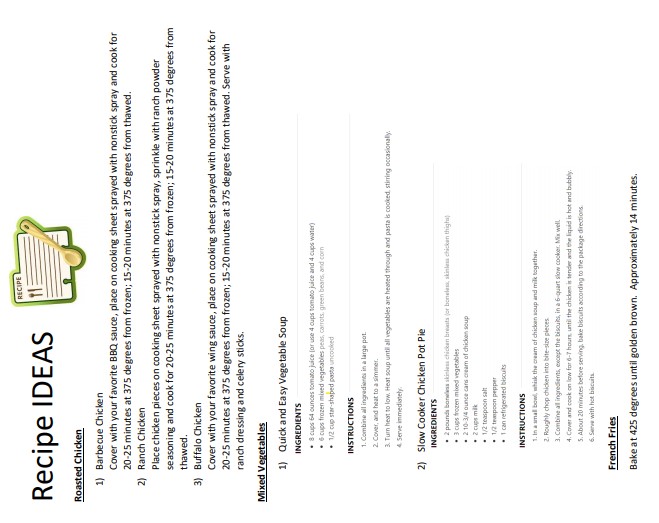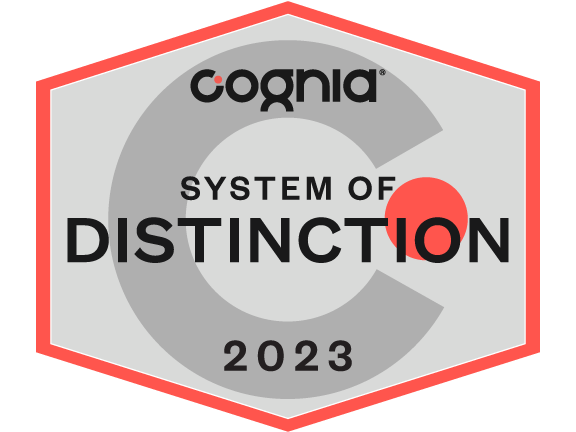Accommodating Special Dietary Needs
Recipes/Prep Instructions
- 100117_Chicken_Fajita_Strips Prep Instructions.pdf
- 110724 Pepper Onion Blend No Salt Added Frozen.pdf
- 16507 French Bread Pepp Pizza Instructions.pdf
- 100348 Corn Whole Kernel No Salt Added Frozen Prep Instructions.pdf
- Cajun Fajita Pasta Recipe.pdf
- Southwest Chicken Fajita Salad Recipe.pdf
- Grilled Chicken Fajitas Recipe.pdf
Download Virtual Meal Recipe Ideas

Nutrition Information
Elmore County Dietary Guidelines
Students’ lifelong eating habits are greatly influenced by the types of foods and beverages made available in their daily environment. Elmore County Public Schools have
1. Beverages in All Schools
Elementary Schools:An Elementary School is defined as a school where the majority of students are in grades Pre-K through 5. No carbonated soft drinks shall be available for sale to students at any time during the school day. No item considered to be in the category of carbonated soft drinks may be provided free of charge to students. No food or beverage item that has high fructose corn syrup or sugar listed as the first ingredient may be made available during the school day. No vending machine display front may display any product that is not water or 100% fruit juice. Items that may be sold include non-carbonated flavored and unflavored water, 100% fruit juices up to 8 ounces with no sweeteners (up to 120 calories), milk up to 8 ounces of low fat, nonfat, flavored (up to 150 calories). No sales of any food or beverage items may occur during meal service times.
Middle Schools: A Middle School is defined as a school where the majority of the students are in grades 6 through 8. The selections available in vending machines or for sale in school stores are to be non-carbonated flavored or unflavored water, 100% fruit juices up to 10 ounces with no added sweeteners and up to 150 calories (120 calories per 8 ounces) or milk up to 10 ounces (low fat, nonfat, flavored) up to 187 calories (150 calories per 8 ounces). No carbonated soft drinks shall be available for sale to students at any time during the school day. No item considered to be in the category of carbonated soft drinks may be provided free of charge to students. No food or beverage item that has high fructose corn syrup or sugar listed as the first ingredient may be available for sale during the school day. No sales of any food or beverage items may occur during meal service times. No vending machine display front may display any product that is not water or fruit juice.
2. Foods of Minimal Nutritional Value in All Schools
In addition to the restrictions regarding the sale of carbonated beverages listed above, no one on the school campus may provide access to “for sale” or “free” foods and beverages of minimal nutritional value as identified under USDA regulations 7CFR 210 Appendix B, Categories of Foods of Minimal Nutritional Value until after the end of the last scheduled class. These classifications are as follows:
- Water ices, including frozen popsicles, ices and slushes, except those containing 100% fruit juice.
- Chewing gum, flavored or unflavored from natural or synthetic sources
- Certain candies, processed predominately from sugar or corn syrup sweeteners or artificial sweeteners combined with a variety of ingredients including but not limited to:
- Hard candies, sour balls, fruit balls, candy sticks, starlight mints, after dinner mints, sugar wafers, rock candy, cinnamon candies, breath mints, and cough drops
- Jellies and gums, such as gum drops, jelly beans, jellied and flavored fruit slices
- Marshmallow candies or other aerated sugar, corn syrup, or invert sugar confections
- Fondants, such as candy corn, and soft mints
- Licorice
- Spun candy, cotton candy
- Candy coated popcorn
School Nurses: This policy does not apply to school nurses using FMNVs or candy during the course of providing health care to individual students.
Celebrations: Class celebrations should follow the celebration/party guidelines set previously. Each celebration should include no more than one food or beverage that does not meet the nutrition standards for foods and beverages.
These guidelines do not restrict what parents may provide for their own child’s lunch or snack. However, no fast foods may be brought into the school cafeteria with competitive wrapping. A school may adopt a more restrictive rule, however, as a local policy.
3. Food Items Sold Through Vending Machines and School Stores in All Schools
Every school shall review its offerings of foods in vending machines and school stores and develop a plan for phasing out low nutritive foods. All schools shall develop a plan to replace those foods with high nutritive foods. Each school should develop a plan with the guidance of the local superintendent or his/her designee that allows for input by students, teachers, and parents. Foods and beverages approved by the local committee shall not be in conflict with the state board policies. The guidelines for foods sold in vending machines and school stores are listed below.
Snack items sold or provided are to follow the guidelines listed below: (per each 1 oz serving
- Less than 30 grams carbohydrate
- Less than 360 milligrams sodium
- Less than 10% daily value of fat
- Contain at least 5% (and preferably 10%) daily value of Vitamin A, C, iron, calcium, or fiber
Additionally, the portion sizes shall follow these requirements.
- Chips, 1.25 oz maximum, baked or containing no more than 3 to 7.5 grams of fat per bag. This includes crackers, popcorn, trail mix, nuts, seeds dried fruit, and pretzels.
- Cookies/cereal bars, 1.3 oz maximum
- Pastries and muffins, 2 oz maximum
- Frozen dairy desserts, low fat ice cream, puddings, jellied fruit bowls, 4 oz maximum
- Yogurt, (low fat) less than 30 grams total carbohydrate, 8 oz maximum
- Milk, reduced fat, 1% or less, flavored and unflavored. Flavored milk to contain no more that 30 grams sugar, 8 oz maximum
- All beverages, other than water, to include milk, sports drinks, 100% fruit juice, and tea must meet size restriction standards set forth in this policy for each grade level.
Serving sizes will comply with the meal pattern requirements as described by the United States Department of Agriculture (USDA) regulations. Foods served and /or sold through the cafeteria shall adhere to the guidelines established by USDA and published in the School Meals Initiative (SMI) for Healthy Children, 1995 guidance.
All fundraising activities that involve the selling of food during school hours or as students gather on the school campus before school begins or as students wait on transportation or otherwise exit the school campus following school dismissal, should reinforce food choices that promote good health. Sales during school hours shall not include those foods listed above as Foods of Minimal Nutritional Value or exceed those portion sizes identified as allowable. This also means that all events outside the school day are not affected by this requirement and that booster clubs, etc., are free to select items for sale for specific fundraising and concession sales as long as the activity does not conflict with this position.



